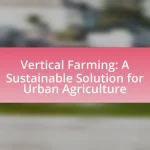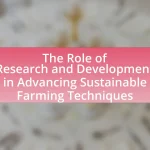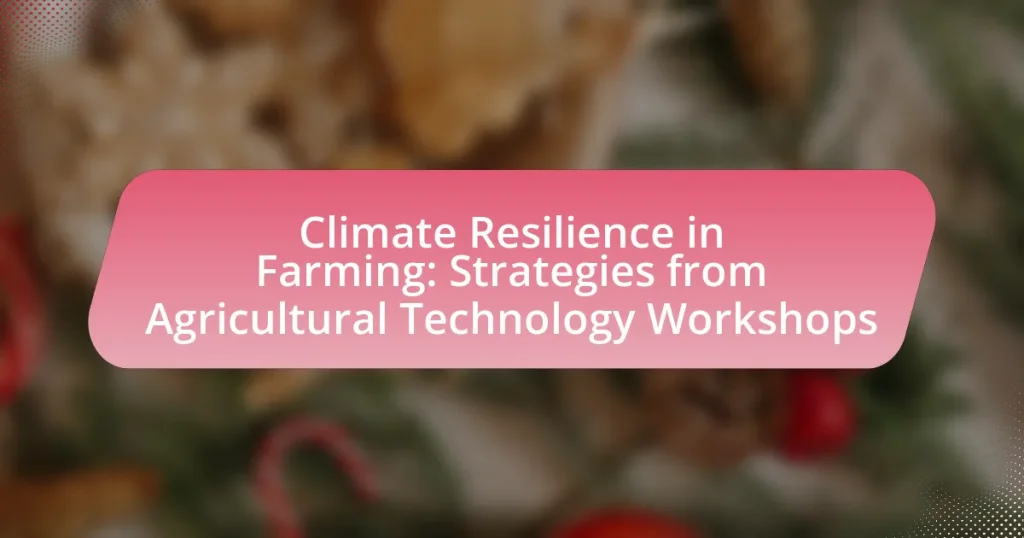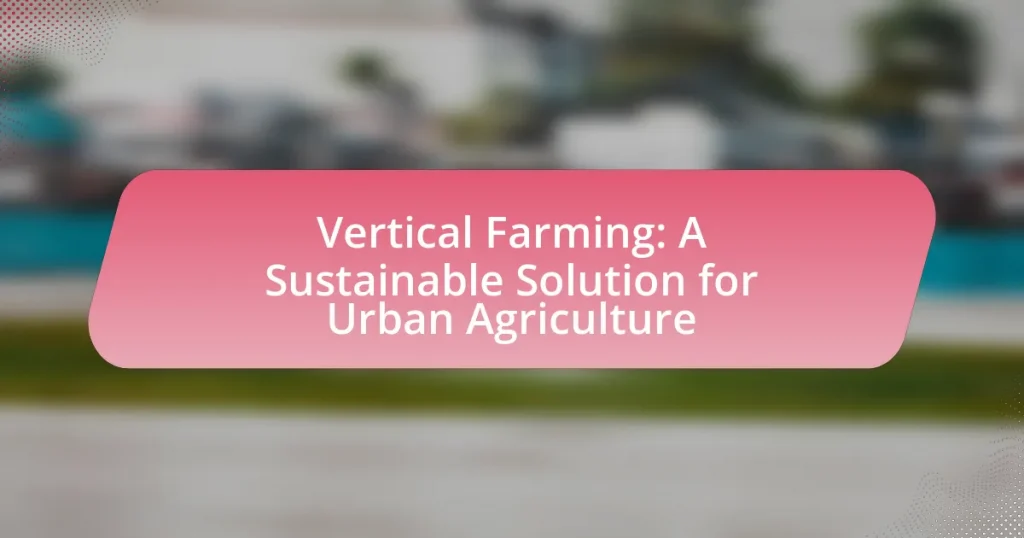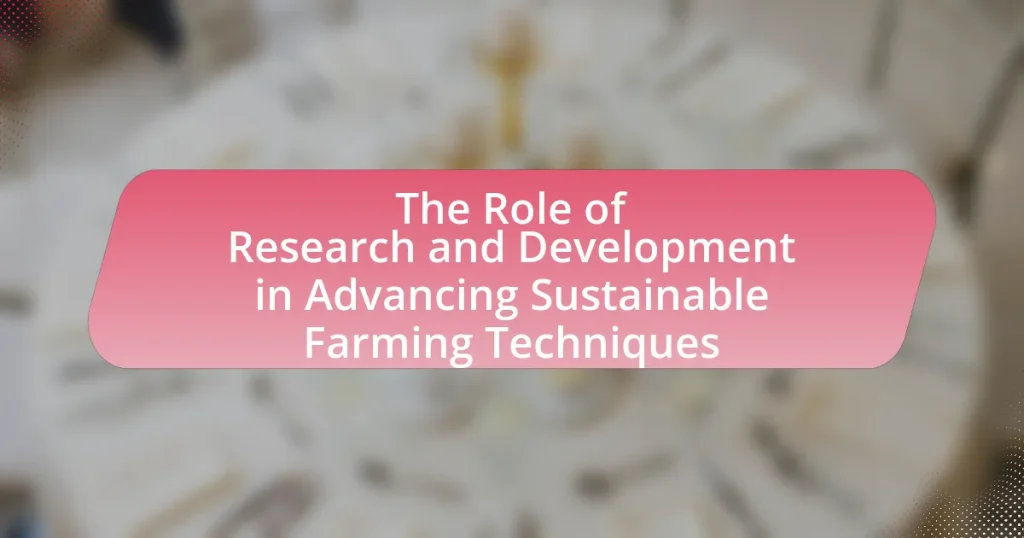Climate resilience in farming refers to the capacity of agricultural systems to adapt to and recover from climate-related stresses, such as extreme weather events and changing temperature patterns. The article explores various strategies to enhance climate resilience, including crop diversification, soil health improvement, and effective water management techniques. It highlights the importance of agricultural technology workshops in educating farmers about sustainable practices and innovative technologies that can increase productivity and reduce vulnerability to climate variability. Additionally, the article discusses the assessment of climate resilience, the potential risks posed by climate change to farming, and the role of community knowledge sharing in promoting adaptive agricultural practices.

What is Climate Resilience in Farming?
Climate resilience in farming refers to the ability of agricultural systems to adapt to and recover from climate-related stresses, such as extreme weather events, droughts, and changing temperature patterns. This resilience is achieved through practices that enhance soil health, diversify crops, and implement water management strategies. For instance, research indicates that crop diversification can reduce vulnerability to climate impacts by spreading risk and improving ecosystem stability. Additionally, adopting conservation tillage and cover cropping can improve soil structure and moisture retention, further supporting resilience against climate variability.
How does climate resilience impact agricultural practices?
Climate resilience significantly impacts agricultural practices by enabling farmers to adapt to changing climate conditions and mitigate risks associated with climate variability. This adaptation includes implementing sustainable farming techniques, such as crop diversification and soil conservation, which enhance productivity and reduce vulnerability to extreme weather events. For instance, a study by the Food and Agriculture Organization (FAO) highlights that resilient agricultural systems can increase yields by up to 20% in regions facing climate stress, demonstrating the effectiveness of these practices in maintaining food security.
What are the key components of climate resilience in farming?
The key components of climate resilience in farming include adaptive management practices, diversified cropping systems, soil health improvement, water management strategies, and the use of climate-resilient crop varieties. Adaptive management practices allow farmers to respond to changing climate conditions effectively, while diversified cropping systems reduce risk by spreading it across different crops. Soil health improvement enhances the land’s ability to retain moisture and nutrients, which is crucial during extreme weather events. Water management strategies, such as rainwater harvesting and efficient irrigation, ensure that crops receive adequate water even during droughts. Lastly, the use of climate-resilient crop varieties can lead to higher yields under adverse conditions, as these varieties are bred to withstand stressors like heat and drought.
How do farmers assess their climate resilience?
Farmers assess their climate resilience by evaluating their ability to adapt to climate variability and extreme weather events. This assessment involves analyzing historical weather patterns, soil health, crop diversity, and water management practices. For instance, farmers may use tools like climate risk assessments and decision-support systems to identify vulnerabilities in their farming systems. Research indicates that farmers who implement adaptive strategies, such as crop rotation and improved irrigation techniques, can enhance their resilience by up to 30% in the face of climate change.
Why is climate resilience important for sustainable agriculture?
Climate resilience is crucial for sustainable agriculture because it enables farming systems to withstand and adapt to climate-related shocks and stresses. This adaptability is essential as climate change leads to increased frequency and intensity of extreme weather events, such as droughts and floods, which can severely impact crop yields and food security. Research indicates that resilient agricultural practices, such as crop diversification and improved soil management, can enhance productivity and reduce vulnerability to climate variability. For instance, a study by the Food and Agriculture Organization highlights that implementing climate-smart agriculture can increase yields by up to 30% in vulnerable regions, demonstrating the importance of resilience in maintaining sustainable food systems.
What are the potential risks of climate change to farming?
Climate change poses significant risks to farming, including altered precipitation patterns, increased temperatures, and the prevalence of pests and diseases. These changes can lead to reduced crop yields, soil degradation, and increased irrigation demands. For instance, a study by the Intergovernmental Panel on Climate Change (IPCC) indicates that global crop yields could decline by up to 25% by 2050 due to climate-related factors. Additionally, extreme weather events, such as droughts and floods, can devastate agricultural production, further threatening food security.
How does climate resilience contribute to food security?
Climate resilience enhances food security by enabling agricultural systems to withstand and adapt to climate-related shocks, such as droughts and floods. Resilient farming practices, such as crop diversification and improved water management, reduce vulnerability to climate impacts, ensuring consistent food production. For instance, research indicates that implementing climate-smart agriculture can increase yields by up to 30% in regions prone to climate variability, thereby directly contributing to food availability and stability.

What strategies are discussed in Agricultural Technology Workshops?
Agricultural Technology Workshops discuss several strategies aimed at enhancing climate resilience in farming. These strategies include the adoption of precision agriculture techniques, which utilize data analytics and technology to optimize resource use and improve crop yields. Workshops also emphasize the importance of integrated pest management to reduce chemical inputs while maintaining productivity. Additionally, the promotion of sustainable practices such as crop rotation and cover cropping is highlighted to enhance soil health and biodiversity. These strategies are supported by research indicating that implementing such practices can significantly mitigate the impacts of climate change on agricultural productivity.
How do workshops educate farmers on climate resilience?
Workshops educate farmers on climate resilience by providing practical training on adaptive agricultural practices and technologies. These workshops often cover topics such as soil management, crop diversification, and water conservation techniques, which are essential for mitigating the impacts of climate change. For instance, a study by the Food and Agriculture Organization (FAO) highlights that farmers who participated in climate resilience workshops improved their crop yields by 20% through the adoption of sustainable practices. This evidence demonstrates that workshops effectively enhance farmers’ knowledge and skills, enabling them to implement strategies that increase their resilience to climate variability.
What types of technologies are highlighted in these workshops?
The workshops highlight various technologies aimed at enhancing climate resilience in farming, including precision agriculture tools, climate-smart irrigation systems, and sustainable pest management technologies. Precision agriculture tools utilize data analytics and GPS technology to optimize field-level management regarding crop farming. Climate-smart irrigation systems, such as drip irrigation and rainwater harvesting, improve water efficiency and reduce dependency on traditional irrigation methods. Sustainable pest management technologies focus on integrated pest management practices that minimize chemical use while maintaining crop health. These technologies collectively contribute to more resilient agricultural practices in the face of climate change.
How do workshops facilitate knowledge sharing among farmers?
Workshops facilitate knowledge sharing among farmers by providing structured environments for interaction, learning, and collaboration. These events enable farmers to exchange best practices, discuss challenges, and learn about new agricultural technologies and techniques that enhance climate resilience. Research indicates that participatory workshops lead to improved adoption of innovative practices, as evidenced by a study published in the Journal of Agricultural Education and Extension, which found that farmers who attended workshops reported a 30% increase in the implementation of sustainable farming practices. This collaborative learning approach not only enhances individual farmer knowledge but also fosters community resilience against climate change impacts.
What role do agricultural technology workshops play in promoting innovation?
Agricultural technology workshops play a crucial role in promoting innovation by providing farmers and stakeholders with hands-on training and access to the latest technological advancements. These workshops facilitate knowledge transfer, enabling participants to learn about sustainable practices, precision agriculture, and climate-resilient techniques. For instance, a study by the Food and Agriculture Organization (FAO) highlights that workshops focusing on digital tools and data analytics have led to a 20% increase in crop yields among participants. This evidence demonstrates that agricultural technology workshops not only enhance skills but also drive the adoption of innovative solutions that improve productivity and sustainability in farming.
How can farmers implement new technologies learned in workshops?
Farmers can implement new technologies learned in workshops by integrating these innovations into their existing farming practices through structured planning and gradual adoption. This process involves assessing the specific needs of their operations, selecting appropriate technologies that align with those needs, and developing a timeline for implementation. For example, farmers can start with pilot projects to test the effectiveness of new tools or methods on a small scale before full-scale adoption. Research indicates that farmers who engage in continuous education and hands-on training, such as that provided in workshops, are more likely to successfully adopt new technologies, leading to improved productivity and sustainability in their farming practices.
What are the success stories from farmers who attended these workshops?
Farmers who attended the agricultural technology workshops have reported significant improvements in crop yields and resilience to climate change. For instance, a farmer from California implemented water-saving irrigation techniques learned in the workshop, resulting in a 30% reduction in water usage while increasing tomato yields by 25%. Another farmer in Texas adopted integrated pest management strategies introduced during the sessions, which led to a 40% decrease in pesticide costs and a healthier crop. These success stories illustrate the practical benefits of the workshops, demonstrating their effectiveness in enhancing agricultural practices and promoting sustainability.

What are the practical applications of strategies learned in workshops?
The practical applications of strategies learned in workshops focused on climate resilience in farming include the implementation of sustainable agricultural practices, enhanced resource management, and improved crop resilience to climate variability. These strategies enable farmers to adopt techniques such as precision agriculture, which utilizes data analytics to optimize inputs and reduce waste, thereby increasing efficiency and sustainability. Additionally, workshops often provide hands-on training in innovative technologies, such as drought-resistant crop varieties and soil health management, which have been shown to improve yields under adverse conditions. Research indicates that farms employing these strategies can experience up to a 30% increase in productivity while reducing their environmental footprint, demonstrating the effectiveness of workshop-derived strategies in real-world applications.
How can farmers adapt their practices based on workshop insights?
Farmers can adapt their practices based on workshop insights by implementing new agricultural technologies and sustainable practices discussed during these sessions. For instance, workshops often provide information on precision agriculture techniques, which utilize data analytics to optimize resource use, thereby enhancing crop yields and reducing waste. Research indicates that farms adopting precision agriculture can increase productivity by up to 15% while minimizing environmental impact. Additionally, farmers can learn about climate-resilient crop varieties that are more tolerant to extreme weather conditions, thus ensuring better harvests in changing climates. These adaptations not only improve farm efficiency but also contribute to long-term sustainability in agriculture.
What specific techniques can enhance climate resilience in farming?
Specific techniques that can enhance climate resilience in farming include crop diversification, agroforestry, conservation tillage, and the use of climate-resilient crop varieties. Crop diversification reduces the risk of total crop failure by spreading risk across different species, while agroforestry integrates trees into farming systems, improving biodiversity and soil health. Conservation tillage minimizes soil disturbance, enhancing soil structure and moisture retention, which is crucial during droughts. Additionally, utilizing climate-resilient crop varieties, such as drought-tolerant or flood-resistant strains, can significantly improve yields under changing climate conditions. These techniques are supported by research indicating that diversified and resilient farming systems can better withstand climate variability and extreme weather events.
How do these techniques vary by region or crop type?
Techniques for climate resilience in farming vary significantly by region and crop type due to differences in climate conditions, soil types, and agricultural practices. For instance, in arid regions, farmers may adopt drought-resistant crop varieties and implement water-saving irrigation techniques, while in humid regions, practices may focus on managing excess moisture and preventing soil erosion. Additionally, specific crops like rice may require different flooding management techniques compared to wheat, which thrives in drier conditions. Research indicates that tailored approaches, such as the use of cover crops in diverse climates, enhance soil health and resilience, demonstrating the necessity of adapting techniques to local environmental conditions and crop requirements.
What are the best practices for achieving climate resilience in farming?
The best practices for achieving climate resilience in farming include implementing crop diversification, adopting conservation tillage, utilizing cover crops, and enhancing water management techniques. Crop diversification reduces the risk of total crop failure due to climate variability, as different crops respond differently to changing conditions. Conservation tillage minimizes soil erosion and improves soil health, which is crucial for maintaining productivity under climate stress. Utilizing cover crops enhances soil fertility and moisture retention, further supporting resilience. Effective water management techniques, such as rainwater harvesting and efficient irrigation systems, ensure that crops receive adequate water even during droughts. These practices are supported by research indicating that farms employing such strategies can better withstand climate-related challenges, thereby improving overall agricultural sustainability.
How can farmers monitor and evaluate their resilience strategies?
Farmers can monitor and evaluate their resilience strategies by utilizing data collection tools, implementing performance metrics, and conducting regular assessments of their agricultural practices. Data collection tools, such as soil moisture sensors and weather stations, provide real-time information on environmental conditions, enabling farmers to make informed decisions. Performance metrics, including crop yield, soil health indicators, and resource use efficiency, allow farmers to quantify the effectiveness of their strategies. Regular assessments, such as comparing historical data with current performance, help identify trends and areas for improvement. These methods are supported by research indicating that data-driven approaches enhance adaptive capacity and resilience in farming systems.
What resources are available for ongoing support and education?
Resources available for ongoing support and education in climate resilience for farming include agricultural extension services, online courses, and community workshops. Agricultural extension services provide farmers with access to expert advice, research-based information, and practical training tailored to local conditions. Online platforms like Coursera and edX offer courses on sustainable farming practices and climate adaptation strategies, enabling farmers to learn at their own pace. Additionally, community workshops organized by local agricultural organizations facilitate peer learning and knowledge sharing among farmers, enhancing their ability to implement climate-resilient practices effectively.
